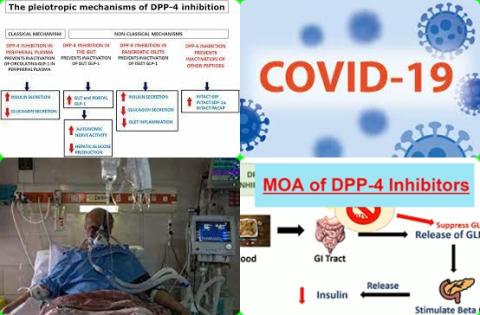
Objectives:
Does dipeptidyl peptidase-4 (DPP-4) inhibitor reduce mortality in COVID-19 patients?
Study design:
This review article included 9 studies with 4,477 COVID-19 patients.
1% of (15%, 46%) the patients use DPP-4 inhibitor. Mortality occurs in 23% (15%, 31%) of the patients.
There was no indication of small-study effects [p = 0.745].
Results and conclusions:
The investigators found DPP-4 inhibitor was significantly associated with a 24%-lower mortality in patients with COVID-19 [RR = 0.76, 95% CI = 0.60 to 0.97, p = 0.030, I2 = 44.5%, p = 0.072].
The investigators found meta-regression analysis showed that the association between DPP-4 inhibitor and mortality was significantly affected by metformin [RR = 1.02, 95% CI = 1.00 to 1.04, p = 0.048] and angiotensin converting enzyme inhibitor or angiotensin receptor blocker (ACEI/ARB) use [RR = 1.04, 95% CI = 1.01 to 1.07, p = 0.006], but not age [p = 0.759], sex [reference: male, p = 0.148] and hypertension [p = 0.218].
The investigators concluded DPP-4 inhibitor use is associated with lower mortality in COVID-19 patients and the association is weaker in patients who are also taking metformin and/or ACE inhibitors.
Original title:
Dipeptidyl peptidase-4 (DPP-4) inhibitor and mortality in coronavirus disease 2019 (COVID-19) - A systematic review, meta-analysis, and meta-regression by Rakhmat II, Kusmala YY, […], Pranata R.
Link:
https://www.ncbi.nlm.nih.gov/pmc/articles/PMC8012165/
Additional information of El Mondo:
Find more information/studies on coronavirus right here.
Dipeptidyl peptidase-4 (DPP4), also known as adenosine deaminase complexing protein 2 or CD26 (cluster of differentiation 26) is a protein that, in humans, is encoded by the DPP4 gene and plays a crucial part in the metabolism of glucose and insulin. Dipeptidyl peptidase-4 inhibitor exerts anti-inflammatory, anti-fibrotic and anti-adipogenic properties, which may be useful in delaying the progression to hyper-inflammation in severe COVID-19 cases.